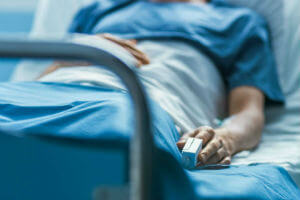
Healthcare-associated infections are a national patient safety problem. One out of every 25 patients are affected at any given time across the U.S. health care system. These infections cause tens of thousands of deaths each year and yet are often preventable.
If you have acquired a healthcare-associated infection while receiving other medical care, contact our experienced West Palm Beach medical malpractice lawyers to learn more about your legal options.
What are Healthcare-Associated Infections?
Healthcare-associated infections (HAIs) are infections patients acquire while they receive treatment for other surgical or medical conditions in a health care setting. These settings may include:
- Hospitals
- Ambulatory clinics
- Surgical centers
- Nursing homes
- Rehabilitation facilities
To be considered a HAI, the infection must develop:
- Up to 48 hours following admission to a hospital
- Up to three days following discharge
- Up to 30 days following surgery
- In a health care facility when the patient was admitted for something other than the infection
According to the Centers for Disease Control (CDC), an estimated 1.7 million HAIs occur in the U.S. each year. These infections result in an estimated 99,000 deaths. Of these infections:
- 32 percent are urinary tract infections
- 22 percent are infections of surgical sites
- 15 percent are pneumonia
- 14 percent are blood stream infections
HAIs put patients at risk of complications. On average, a patient who acquires a HAI spends six and a half more days in the hospital. He or she is more likely to be readmitted following initial discharge. The risk of death is also twice as high when HAIs are involved.
When a surgical patient acquires a HAI, he or she is 60 percent more likely to need to be admitted to a facility’s intensive care unit (ICU). Infections associated with surgery account for an estimated 10 billion dollars in health care expenditures each year.
Who Is Most At-Risk for Infection?
While anyone who is hospitalized is at risk for acquiring a HAI, certain patients are at a higher risk than others. Those most at-risk are:
- Elderly patients
- Young children
- Patients with compromised immune systems
- Patients who are hospitalized for long periods of time
- Patients who have indwelling catheters
How to Prevent a Healthcare-Associated Infection
Studies show that many HAIs can be prevented when health care facilities and staff stick to best practices for infection control. These include:
- Health care workers should wash their hands with both soap and water, or use an alcohol-based hand rub, both before and after contact with each patient.
- Catheters should only be used when necessary and removed as soon as possible.
- The skin surrounding a surgical site or where a catheter is to be inserted should be cleaned.
- When appropriate, health care workers should wear masks, gloves, gowns and hair covers.
To help protect yourself against HAIs:
- Ask your doctor what he or she is doing to protect you from HAIs. Ask questions and discuss any worries you have.
- Make sure all health care workers wash their hands before they touch you.
- Ask your health care provider about any antibiotics you are given, and if tests have been performed to ensure you are prescribed the correct antibiotic.
- Watch for the symptoms of infection. Tell your health care provider if you experience three or more episodes of diarrhea within 24 hours, especially when taking antibiotics.
- Ensure you are up-to-date on all vaccines, including the flu shot.
Liability for Healthcare-Associated Infections
HAIs may be considered medical malpractice when infection control protocols are not followed. The health care facility or health care provider may be held liable.
To prove a medical malpractice claim for a HAI, you must establish that the facility or provider was not in compliance with appropriate medical standards of care throughout your treatment. If the infection is found to have been preventable and a result of negligence, the facility or provider may be responsible. Testimony from medical expert witnesses who examine the treatment situation for compliance is typically used to establish such claims.
Speak with a Qualified Attorney Today
If you have acquired an infection in a health care setting, you may be entitled to compensation for related damages such as medical bills, lost wages, and pain and suffering. Our qualified attorneys can review your claim and pursue the maximum compensation you deserve.
Request a free, no obligation consultation today and learn your legal rights. There are no upfront fees and payment is only due if we recover compensation for you.
Call (855) 722-2552 or complete our Free Case Evaluation form now.

 855-722-2552
855-722-2552